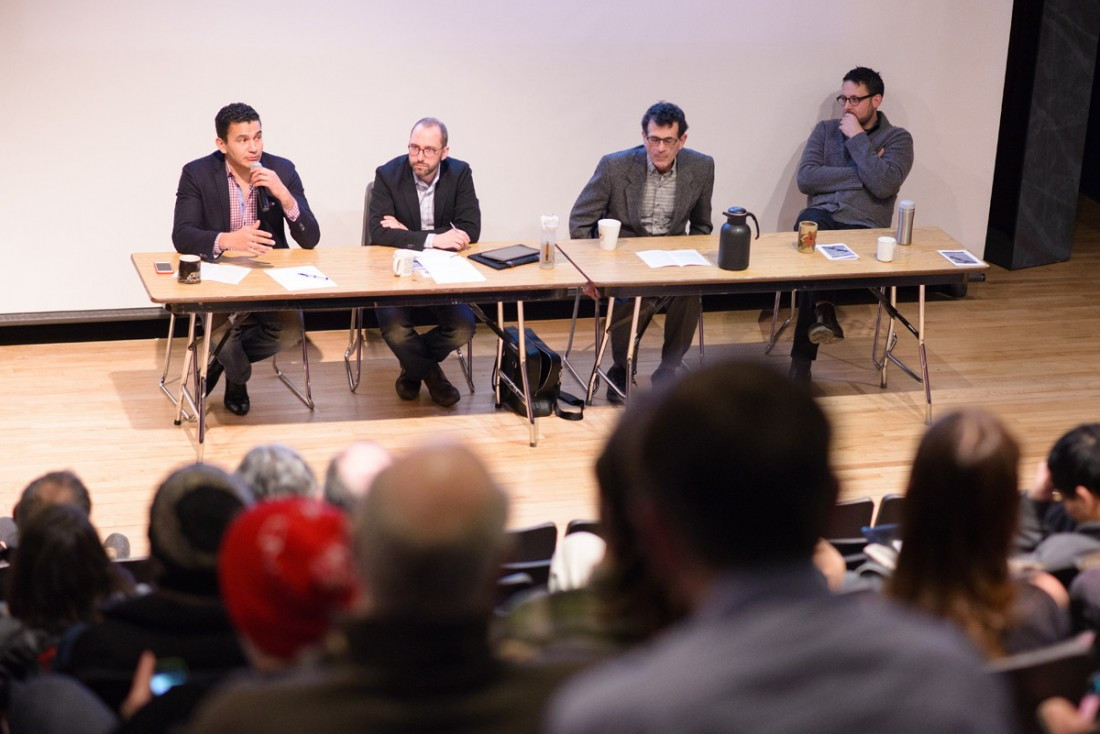Energetic debate
Energy East Pipeline discussion arrives on campus
TransCanada’s Energy East Pipeline promises to benefit the economy and create jobs but critics argue those benefits come at a cost.
The project will convert an existing natural gas pipeline that runs from Alberta to the Ontario-Quebec border into one that transports crude oil. With a pipeline extension to New Brunswick, approximately 1.1 million barrels of crude oil per day will move from the tar-sands to the East Coast, where the oil would be processed in refineries and exported.
The pipeline passes through Manitoba, crossing the La Salle and Red Rivers on the southern edge of Winnipeg.
On Monday, Feb. 23, a panel of speakers met at the University of Winnipeg (U of W) to discuss the pipeline, and the ways in which the impact could not only be harmful on a national level, but a global one.
“The Intergovernmental Panel on Climate Change suggests that in order to keep our climate stable, we curb our emissions,” Ian Mauro, associate professor in the department of geography at the U of W, says. “If we want to do that, we’ll have to keep a half to four-fifths of known reserves in the ground. That’s quite an ambitious task, because the value of all of those reserves is $27 trillion. That’s why politicians are supporting it.”
“The pressure to get this out of the ground and burn it as fast as possible exists because one day, as a result of climate change, we won’t allow ourselves to live the way we’re living.”
The need to quickly bring the oil to market seems to have taken priority over Canadian safety, critics argue. Only one of six parallel gas pipelines will be converted to carry oil, but if any of those pipelines rupture, the oil will intensify the explosion by giving it a thousand times the energy. This is especially concerning, because not only will the pipeline run across the Red River, but directly through Treaty 3 land in eastern Manitoba and northwest Ontario.
“The consultation process is flawed,” Wab Kinew, associate vice-president of Indigenous Affairs at the U of W says.
“If the Treaty refuses to allow the pipeline to go through their land, a meaningful conclusion would be that TransCanada then goes around it. Instead, it’s a question of how much. How much is it going to take for you, Wab, to give up the memories that you had of the lake as a boy, the experiences that you’re forging with your sons, the values that you were taught by elders?”
As for the promise of jobs, Tim Duboyce, spokesman for TransCanada’s Energy East Pipeline project estimates almost 200 jobs will be supported during the first 20 years of service, through contracts and trades.
“For Manitoba GDP activity is going to go up by $1.8 billion over the construction phase and the first 20 years of operation of the oil service pipeline,” Duboyce says. “If you look at job creation, you’re looking at a little bit more than 500 jobs in Manitoba over the construction period, so that’s not bad when you consider the pipeline is already there.”
For some, the economic benefits of the pipeline versus the environmental consequences don’t balance out.
“It’s put us in a very curious situation,” says Sabrina Koehn, a student at the U of W. “It’s endangering our beliefs, and it’s endangering our land. If we don’t start changing the way we look at things, the way we do things, we’re going to ruin this planet.”
According to Mauro, the public can get involved in the development of the pipeline but it will take concrete action.
“There are critical nodes where you can stop a pipeline,” Mauro says. “The veto power, the environmental impact, it’s crucial to bring these things to collective awareness. Having these kinds of forums are important, but I don’t think this is going to stop the pipeline, not for a second. You want to stop a pipeline? You gotta get serious.”
- With files from Danielle Da Silva.
Go to neb-one.gc.ca/pplctnflng/mjrpp/nrgyst/index-eng for more information on the Energy East Pipeline.
Published in Volume 69, Number 23 of The Uniter (March 4, 2015)







